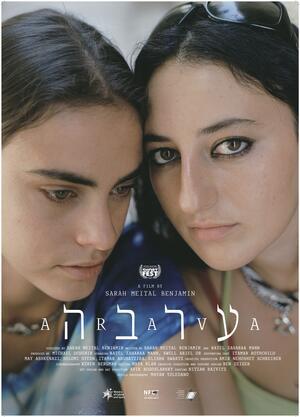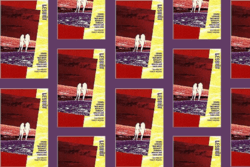Q & A with Sarah Meital Benjamin about Her New Film, 'Arava'
JWA chats with Sarah Meital Benjamin, director of the new short film Arava, which tells the story of two teenage best friends traveling through small-town Israel in search of redemption.
JWA: The film is set in a very specific world. Can you talk a little bit about that world and why you chose to set your film there?
Sarah Meital Benjamin: Sure. So I grew up in Jerusalem in a family that was very atypical for our community. I was a single child to a single mom. I grew up Orthodox, and pretty quickly, in my teens, being already the odd one out, I found my way to the very saturated and vibrant world of the street culture of Jerusalem [of the early 2000s]. I was, like, someone who left the community, but never really rejected the community, never rejected the faith, never rejected the religion —just kind of stepped out of it throughout my teens.
At the time in Jerusalem, there was a really rich punk scene, with a lot of bands and people from all over. That community was, like, the only place that I have ever seen before that brought together these really diverse groups of people from all walks of life. You know, you had kids from the LGBTQ community, Palestinian skaters, ex-Orthodox punk musicians, people who were, like, newcomers from Russia who haven't even spoken in Hebrew yet.
And it just brought together a lot of youth that was like, for whatever reason, not really getting along with more mainstream frameworks like high schools or yeshivas, etc. And we just basically were living in squads or, you know, kind of traveling through Israel. And that was my story.
That’s where Arava came from, because it's based on a real story that happened. There's a bit of a self-portrait there, for sure.
JWA: So can you say a little bit about some of the questions or issues that you’re trying to raise in this film?
SMB: Sure. So I think that overall, awareness of the kind of realities of youth at-risk in Israel is important to me. Maybe I should start with the characters in the story: two teenage girls facing a difficult situation and a bit of a complex reality. They're not really with their families. They're not really at home; they're not very protected. When I was a kid, you know, there were so many programs for kids that didn't get involved in the mainstream system. And that's where those girls belong. It's basically these programs that take teenagers who are doing bad stuff, like drugs, or they have problems with the law or they don't go to school, or they’re just not living at home anymore. And they put them to work on farms or kibbutzim or different places. And so it's a bit of, like, a healing process through agricultural work, and that's the place she came from. I've been to many of those as a child. They didn't really know where to put me.. I was, like, always a kid that never did bad stuff, but I was just not going to school. And they're like, okay, well we need to put you somewhere. And so that's how I kind of became familiar with those sorts of programs.
[In the film], Arava came back from this kind of place. And of course she immediately finds her troublemaker friend Tzipi, who is running away from the law. She's in trouble. And she convinces Arava to join her [on a trip to a Jewish sanctum in the north of the country].
And now I'm gonna move to the greater topic, which was important for me in the sense of representation. The kind of films that we put out there from Israel are very, very often related to the military or related to some form of oppression within the Orthodox community, you know? Anti-women or anti-gay—those are the themes that really feed the world's interest in Israel, unfortunately. And I feel like as an Israeli artist, we have this responsibility to give a representation to the kind of place I come from. I come from Jerusalem, I come from a religious family—you know, that's my story.
JWA: It occurred to me that, like, things that were happening in Israel in the early 2000s, the bus bombings…it was a very fraught time, and that is not part of the backdrop of this film, I think intentionally. It’s a—not a smaller story in importance, but in intimacy.
SMB: Thank you. That's amazing to hear. I want to create characters that are complex and they're no angels, but you have compassion for them. I wanted to create human characters.
JWA: I wanted to ask about the role that gender and sexuality play in the film. You have this friendship between these two girls, but it's a complicated relationship. Could you say a little bit about their relationship?
SMB: Sure. When you come from the kind of community that we came from, like, nobody really talks about any type of fluidity in gender. It's not like people talk against it. They just—it's not mentioned at all. So it's kind of like, your first time discovering you're attracted to a woman and, like, what does that mean? And I think this kind of border between friendship and romantic love, in that age when you're “the two of us against the world”—I've experienced it personally.
JWA: So you mentioned that Arava is your first film, and I know you've worked a lot in photography and in casting. What made you decide to try directing a film?
SMB: So I had, like, an accidental career in casting. I just kind of started doing street-style photography and social media. People were contacting me, and next thing you know, I just opened a casting agency with a friend of mine. It all happened so fast. We were doing casting for fashion and for advertising and for cinema and stuff like that, but it was always telling a story that was not mine. Helping directors or photographers or creative directors tell the stories they wanted to tell gave me tools to start looking at mine.
And I was like, wait, I'm from, like, a cool-ass place. I mean, who knows what the punks in Jerusalem were like? Nobody—just me.
JWA: You’re also working on a feature film. Can you tell us anything about that?
SMB: Yeah. So the film is called Lion's Milk and it's, uh, the story of a girl named Shir from Mea Shearim [an ultra-Orthodox Jerusalem neighborhood] who is an only child to a single mom who is mentally challenged. And she kind of took the parent role at too young of an age, and she's longing to experience any type of youth. She stumbles upon Zion Square [in Jerusalem], meets this guy, and then her double life begins where she's, like, in her Orthodox community, she takes care of her mom, she's an excellent student, but at night she sneaks out to hang out with the kids. And she tries to kind of hold a facade as long as possible, until her cover gets blown and everything changes for her. Again, it's mostly my story, but it's a bit of other people's stories as well.
JWA: And when will North American audiences have a chance to see Arava?
Sarah: The film just premiered at the Palm Springs International ShortFest and is now on a festival circuit run. Hopefully within the year it will be released for streaming! You can stay up to date on Instagram @sarahmeital.









Hello Sarah: I would very much like to see your film. Please let me know when it is available. Thank you!
Sharonah Laemmle
<sharonahlaemmle1@gmail.com>
I look forward to seeing this film!